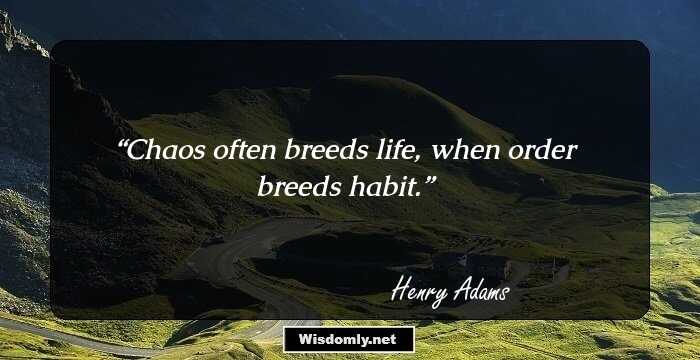78 Albert Ellis Quotes You Must Know
The great mind behind the development of rational emotive behavior therapy, Dr. Albert Ellis was a leading American psychologist. He was an eminent figure in the field of clinical psychology, philosophy and psychotherapy. Ellis was the pioneer of the cognitive revolutionary paradigm shift in psychotherapy. He was also renowned for formulation and development of cognitive behavioral therapy. According to Psychology Today, his significance in the field of modern psychotherapy had an impact even greater than Sigmund Freud. An aggregative survey of US and Canadian professional psychologist rated Ellis as the second most influential psychotherapist in history (only behind Carl Roger). Besides his extraordinary success in the field of clinical psychology, he also had a great literary career. He published various bestsellers such as ‘Stress Counselling: A Rational Emotive Behaviour Approach’, ‘Alcohol: How to Give It Up’, ‘Be Glad You Did’ and ‘Overcoming Resistance: Rational-Emotive Therapy With Difficult Clients’. His endless list of accolades include Lifetime Distinguished Service Award from the New York State Psychological Association, 2005 Lifetime Achievement Award from Association for Behavioral and Cognitive Therapies, "Humanist of the Year" from American Humanist Association and many more. We have collected some of his long lasting quotes from his writings, speeches, interviews and thoughts. Go through these quotes from this iconic psychotherapist highlighting his thoughts and sayings.
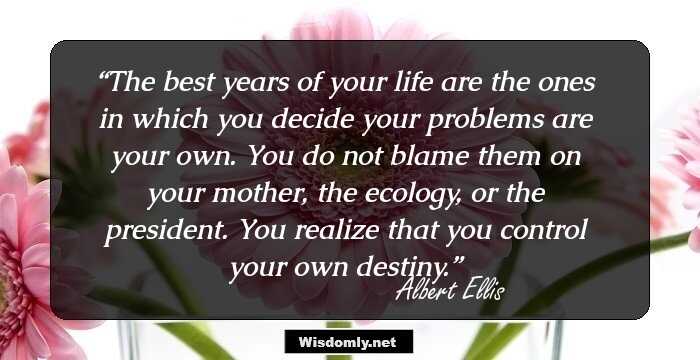
The best years of your life are the ones in which you decide your problems are your own. You do not blame them on your mother, the ecology, or the president. You realize that you control your own destiny.

There are three musts that hold us back: I must do well. You must treat me well . And the world must be easy.
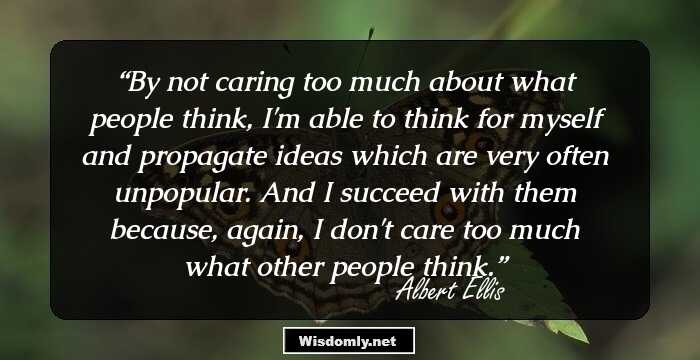
By not caring too much about what people think, I'm able to think for myself and propagate ideas which are very often unpopular. And I succeed with them because, again, I don't care too much what other people think.
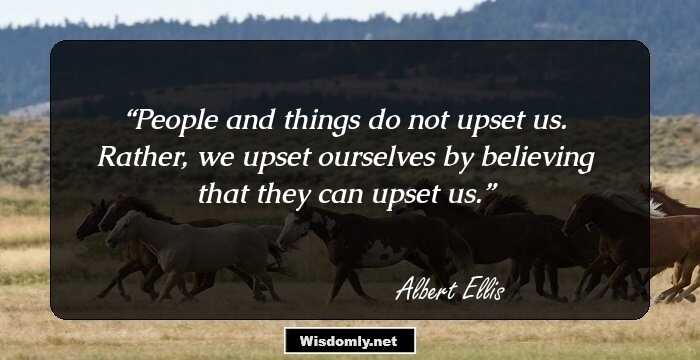
People and things do not upset us. Rather, we upset ourselves by believing that they can upset us.
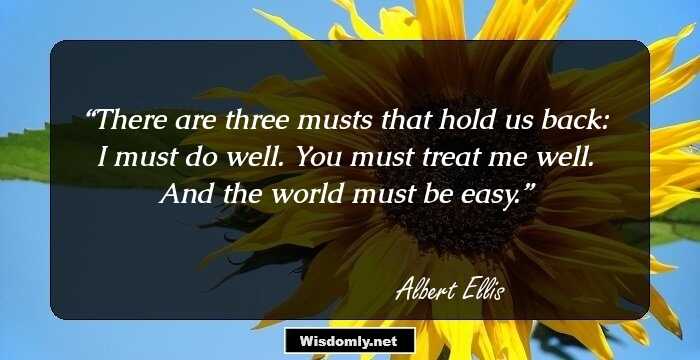
There are three musts that hold us back: I must do well. You must treat me well. And the world must be easy.
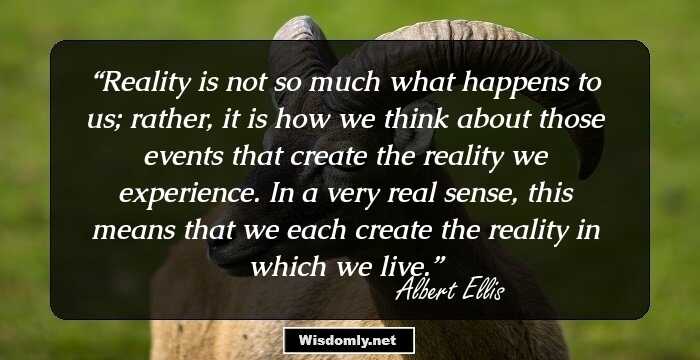
Reality is not so much what happens to us; rather, it is how we think about those events that create the reality we experience. In a very real sense, this means that we each create the reality in which we live.
You have considerable power to construct self-helping thoughts, feelings and actions as well as to construct self-defeating behaviors. You have the ability, if you use it, to choose healthy instead of unhealthy thinking, feeling and acting.
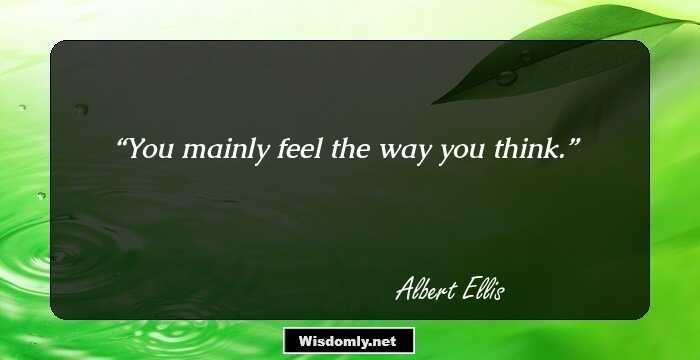
You mainly feel the way you think.
It is only in your mind that you have to excel, at anything or everything. Of course, it would be very nice to excel at most things. Indeed, we recommend that you try and do your best. But realistically, you are entitled to do the bare minimum to get by. All your accomplishments are just a bonus, something to enjoy, not requirements. You don't have to do anything to prove that you are worthy of existing.
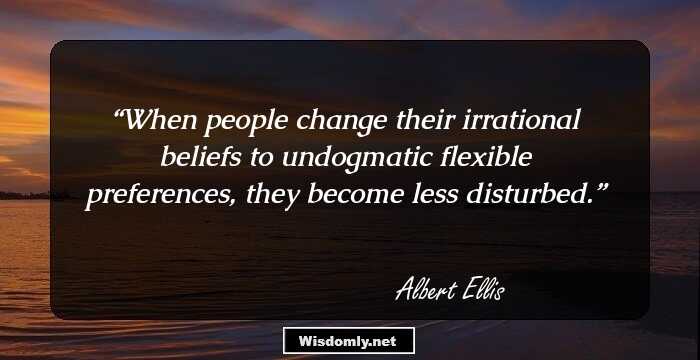
When people change their irrational beliefs to undogmatic flexible preferences, they become less disturbed.
People don't just get upset. They contribute to their upsetness. They always have the power to think, and to think about their thinking, and to think about thinking about their thinking, which the goddamn dolphin, as far as we know, can't do. Therefore they have much greater ability to change themselves than any other animal has.
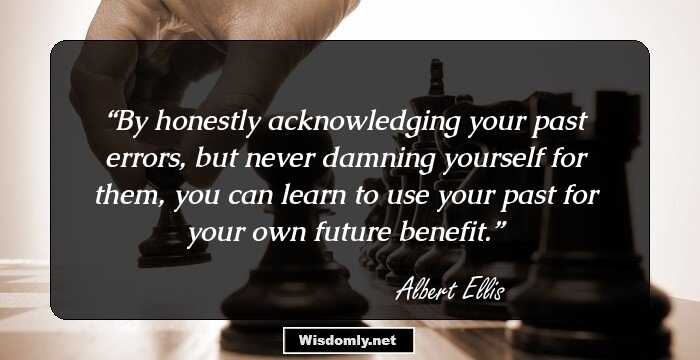
By honestly acknowledging your past errors, but never damning yourself for them, you can learn to use your past for your own future benefit.
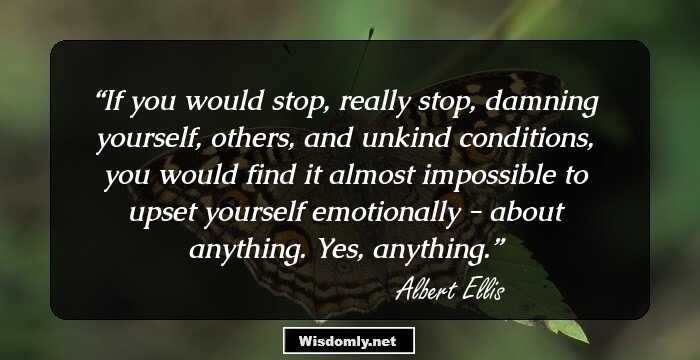
If you would stop, really stop, damning yourself, others, and unkind conditions, you would find it almost impossible to upset yourself emotionally - about anything. Yes, anything.
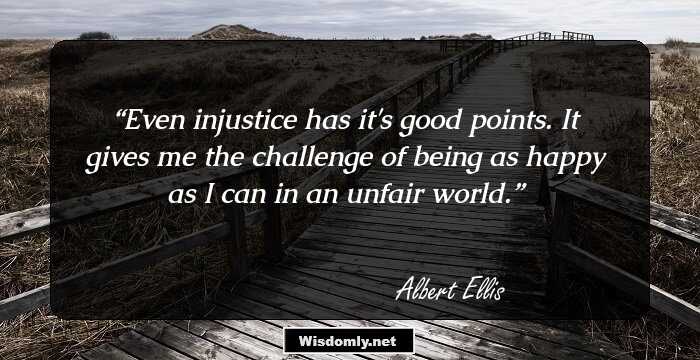
Even injustice has it's good points. It gives me the challenge of being as happy as I can in an unfair world.
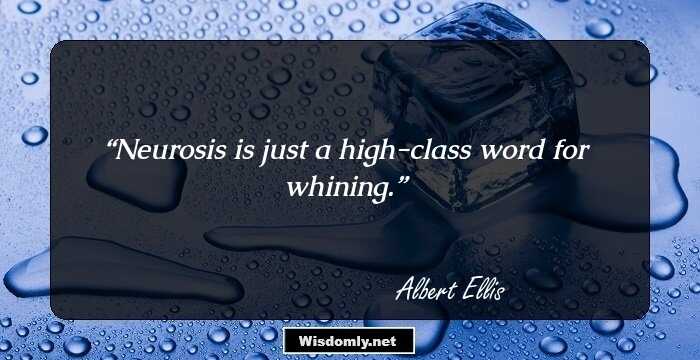
Neurosis is just a high-class word for whining.
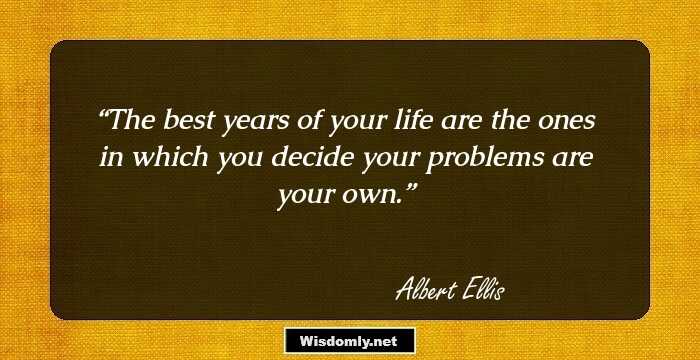
The best years of your life are the ones in which you decide your problems are your own.
Life is indeed difficult, partly because of the real difficulties we must overcome in order to survive, and partly because of our own innate desire to always do better, to overcome new challenges, to self-actualize. Happiness is experienced largely in striving towards a goal, not in having attained things, because our nature is always to want to go on to the next endeavor.
If human emotions largely result from thinking, then one may appreciably control one's feelings by controlling one's thoughts - or by changing the internalized sentences, or self-talk, with which one largely created the feeling in the first place.
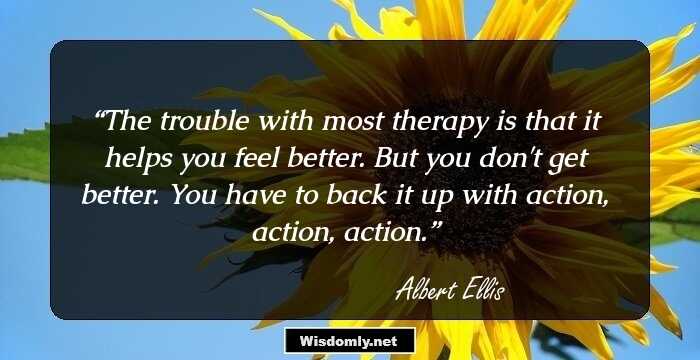
The trouble with most therapy is that it helps you feel better. But you don't get better. You have to back it up with action, action, action.
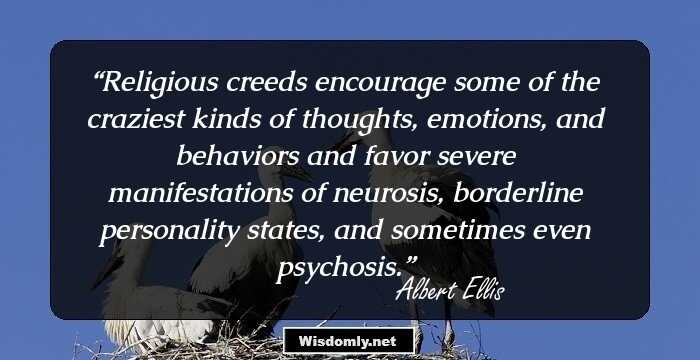
Religious creeds encourage some of the craziest kinds of thoughts, emotions, and behaviors and favor severe manifestations of neurosis, borderline personality states, and sometimes even psychosis.
If people stopped looking on their emotions as ethereal, almost inhuman processes, and realistically viewed them as being largely composed of perceptions, thoughts, evaluations, and internalized sentences, they would find it quite possible to work calmly and concertedly at changing them.

Whatever may be, I am still largely the creator and ruler of my emotional destiny.
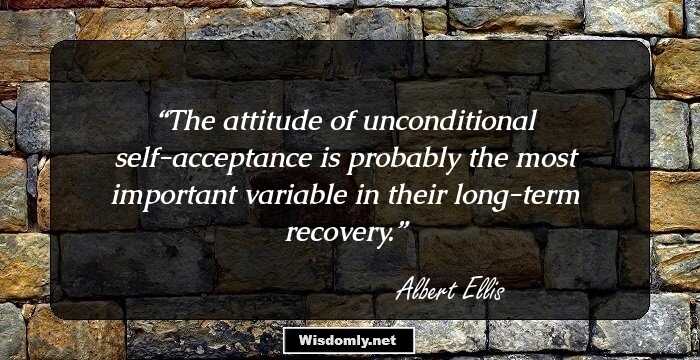
The attitude of unconditional self-acceptance is probably the most important variable in their long-term recovery.
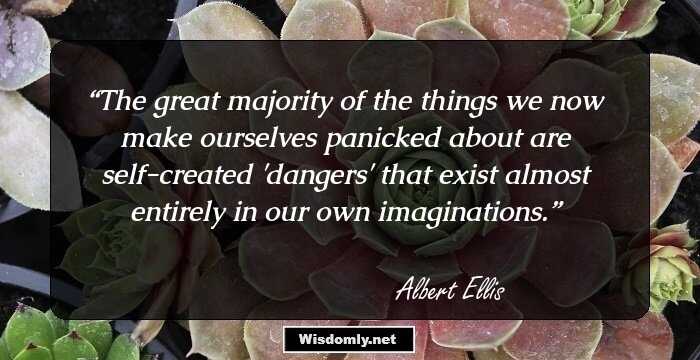
The great majority of the things we now make ourselves panicked about are self-created 'dangers' that exist almost entirely in our own imaginations.
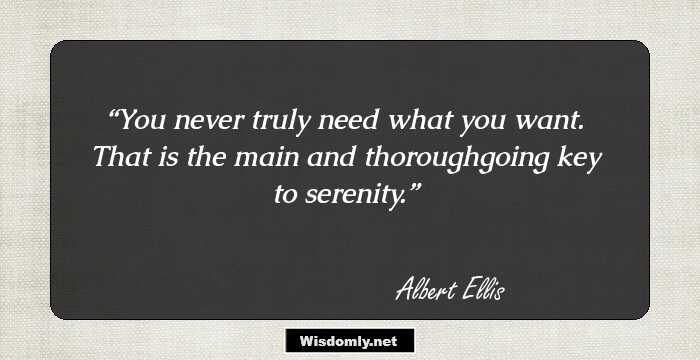
You never truly need what you want. That is the main and thoroughgoing key to serenity.
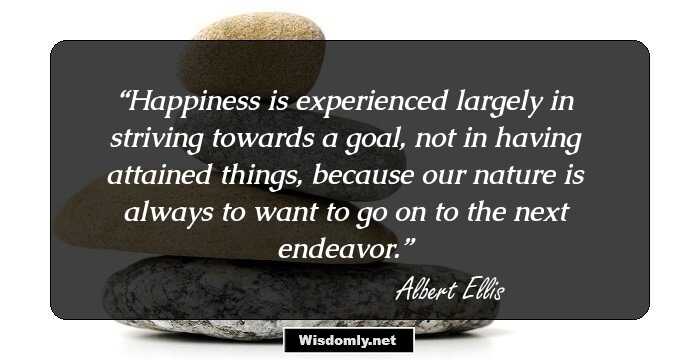
Happiness is experienced largely in striving towards a goal, not in having attained things, because our nature is always to want to go on to the next endeavor.
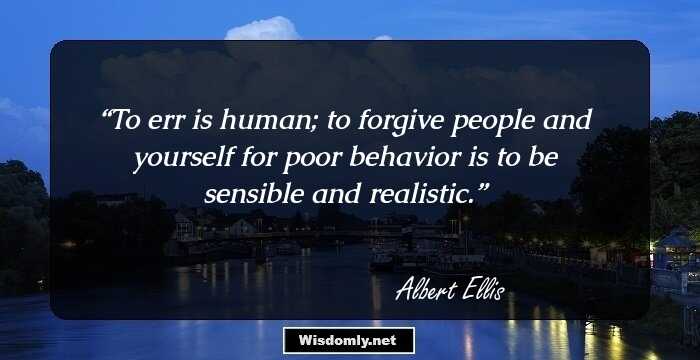
To err is human; to forgive people and yourself for poor behavior is to be sensible and realistic.
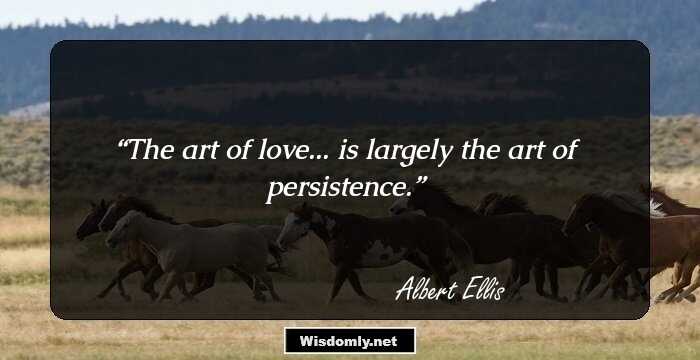
The art of love... is largely the art of persistence.
The emotionally sound person should be able to take risks, to ask himself what he really would like to do in life, and then to try to do this, even though he has to risk defeat or failure. He should be adventurous (though not necessarily foolhardy); be willing to try almost anything once, just to see how he likes it; and look forward to some breaks in his usual life routines.
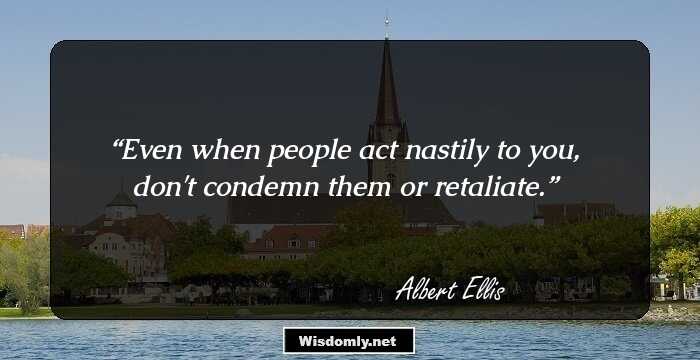
Even when people act nastily to you, don't condemn them or retaliate.







